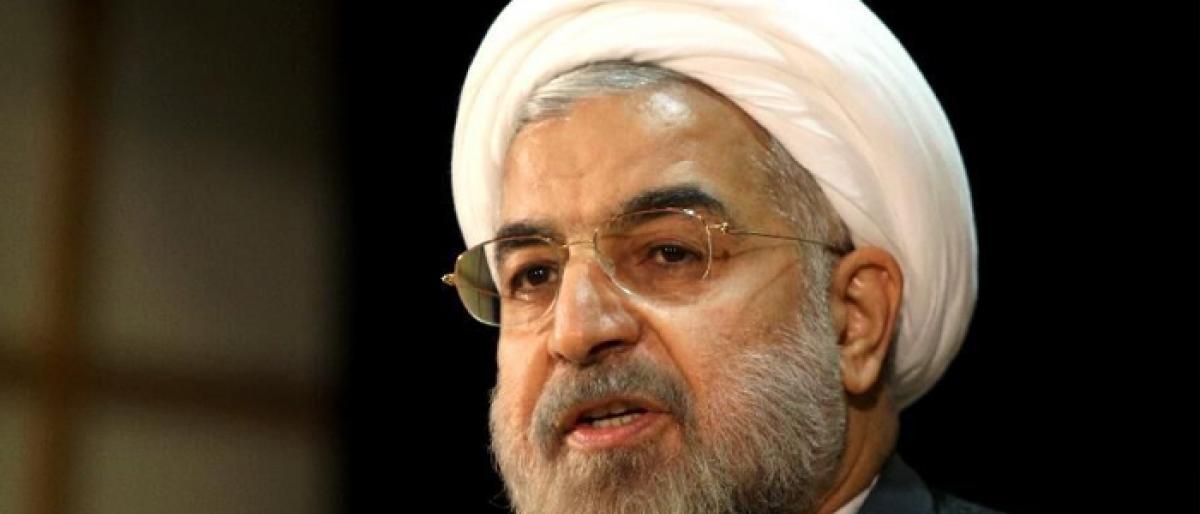Live
- Members of Legislative Council Join YSR Congress Party in Massive Election Campaign in Buchireddypalem Mandal
- YV Ramireddy Criticizes MLA Sridhar Reddy for His Comments on Adala Prabhakar Reddy
- Visakhapatnam: Amid special prayers and bike rallies, candidates file nominations
- AIMIM works for its own welfare, neglects Old City denizens
- Palle Sindhura Reddy flays YS Jagan during election campaign in Puttaparthi
- Senior JSP leader Manukranth Reddy quits party, joins YSRCP
- Asad files nomination papers for Hyd’bad Lok Sabha seat
- GHMC implements weekly ‘basti’ action plan
- NDA will sweep polls in State, says Balayya
- Hyderabad: Mother kills self over threats to son
Just In

The exodus of international firms from Iran is accelerating as the August deadline for the reimposition of US sanctions against Tehran approaches President Donald Trumps decision to withdraw the United States from the multinational Joint Comprehensive Place of Action JCPOA, which lifted international sanctions against Iran in exchange for curbs on its nuclear program, has left the 2015 accord
The exodus of international firms from Iran is accelerating as the August deadline for the re-imposition of US sanctions against Tehran approaches. President Donald Trump’s decision to withdraw the United States from the multinational Joint Comprehensive Place of Action (JCPOA), which lifted international sanctions against Iran in exchange for curbs on its nuclear program, has left the 2015 accord hanging dangerously in the balance.
On July 7, French shipping giant CMA CGM announced its decision to leave Iran “due to the Trump administration,” the group’s chief executive Rodolphe Saadé said. The announcement came two days after talks in Vienna between Iranian Foreign Minister Mohammed Javad Zarif and his counterparts from Britain, China, France, Germany and Russia produced no breakthroughs. The first of its kind since Trump’s withdrawal announcement in May, the meeting was intended to provide the Islamic Republic with an economic package that would make up for its losses under US sanctions.
Today, the weakened nuclear agreement confronts three possible fates: survival, abrupt death, or gradual demise. President Hassan Rouhani reiterated Iran’s commitment to the pact shortly before the Vienna meeting but, a few days later, in a phone conversation with German Chancellor Angela Merkel, he described the compensatory European Union package as “disappointing” and lacking “a clear roadmap.”
To persuade the Iranian leadership to abide by the JCPOA, Europe has a three-pronged action plan that consists of guaranteeing European Investment Bank (EIB) services to Iran, activating the “blocking statute” to safeguard European firms active in Iran against US secondary sanctions, and securing direct credit transfers to Iran’s central bank that would bypass the US financial system.
According to French Foreign Minister Jean-Yves Le Drian, Europe will probably fall short of shielding Iran from US nuclear sanctions by August, but its protective economic package may yet come through by November 4, when the second round of penalties against Tehran are set to take effect. Barring significant domestic or foreign developments, the Iranian leadership is likely to wait till November, while monitoring European efforts. Notably, on July 17, Behrouz Kamalvandi, spokesperson for the Atomic Energy Organization of Iran (AEOI) confirmed that Tehran has received Europe’s package of incentives and that it meets “elements of Iran’s demands but still requires further consideration.”
It was Khamenei’s policy of “heroic flexibility” that made entering nuclear negotiations with world powers in 2013 possible in the first place, and the near failure of that landmark policy, manifested by the US withdrawal from the JCPOA and the restoration of sanctions, has cost Iran’s top leader politically. A decision by Khamenei to take this path would see Iran resuming nuclear work on a larger scale and faster pace than in the past, and cause the sudden collapse of the agreement.
Such a decision by the Iranian leader, however, would alienate China and Russia and set Iran on a collision course with Western powers, not least Europe. It would also pave the way for the re-adoption of UN Security Council sanctions against Tehran. For this and other reasons, including the concern that Israel could launch a military response, the Iranian leadership is unlikely to go down the path of nuclear “breakout.”
To avoid inviting military action at a time of growing domestic dissent and heightened tensions with neighbors, or having its nuclear dossier reopened at the UN Security Council, Iran will probably try to creep out – rather than break out – of the JCPOA if efforts to guarantee benefits of staying in it fail. This is partly because Tehran seems to have reached the conclusion that even if Europe does summon the political will to shield Iran from US penalties, it may not be able to resist American pressure in the long run, and it may ask Tehran to make other compromises, such as on its missile program and regional interventions, in return.
In practice, creep-out may take the form of implementing the accord selectively, perhaps by measures like allowing the International Atomic Energy Agency (IAEA) inspectors limited or delayed access to Iran’s nuclear sites.
Gradual demise of the nuclear deal appears the most likely outcome if Europe, Russia and China fail to neutralise crippling US sanctions against Iran. Though it might not lead directly to war, this scenario would substantially escalate regional tensions and further destabilize the Middle East.
By: Maysam Behravesh
(Writer is an affiliated researcher at the Center for Middle Eastern Studies, Lund University, Sweden)

© 2024 Hyderabad Media House Limited/The Hans India. All rights reserved. Powered by hocalwire.com







